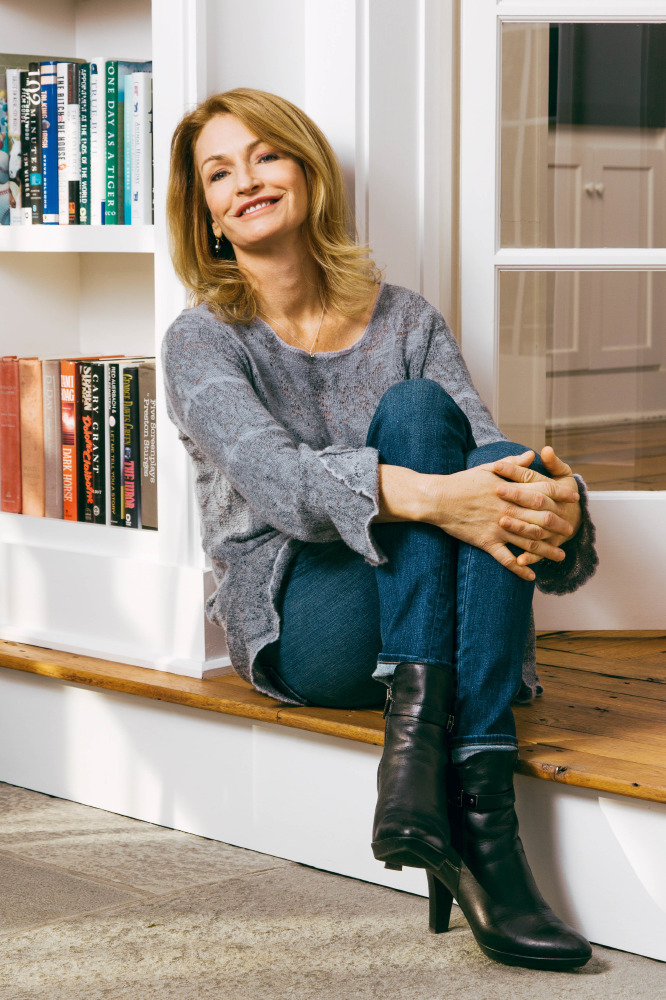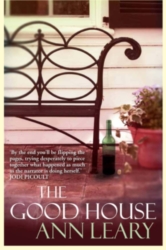
Ann Leary
THE GOOD HOUSE is about a woman named Hildy Good, who lives in a small town on Boston’s North Shore. By day, she’s a successful real-estate broker, good neighbour, mother and grandmother, but her nights are lonely, due in part to her daughters’ intrusive “intervention” and Hildy’s subsequent stint at a rehab for a drinking problem that she knows she doesn’t really have. So it is, in part, about a woman who feels lonely and unjustly persecuted by those who are dearest to her, but it’s also the story of the community in which she grew up – a craggy New England seacoast town that harbours many secrets from the past and the present. There’s a scandal, a love story, a bit of mysticism (Hildy’s ancestress was one of the witches hung in the witch trials in nearby Salem, and Hildy appears to have some intuitive gifts). There are horses, dogs, ghosts, lovers, babies, lobstermen, old houses and drinking, and some scary stuff like blackouts, arrests, a missing child and a woman who is becoming slightly unhinged by obsessive love.
The Good House also features a love story between two sixty-year-olds. Hildy and her high school sweetheart Frank, another townie whose family has lived in the community for generations, rekindle their romance in the course of the novel. I am thrilled to be able to report that Meryl Streep has recently signed on to play Hildy Good and Robert Deniro has been cast as Frank in the upcoming film version of the book.
You host a radio show on NPR, so what can you tell us about this?
Hash Hags is currently on hiatus but it is a weekly NPR radio show that I co-host with authors Julie Klam and Laura Zigman. We interview other authors about their lives and their work and have had some great guests such as Alice Hoffman, Meg Wolitzer, Jon Ronson and many others. You can listen to podcasts of the show by going to the website: www.hashhags .com
You have written non-fiction and fiction for various publications, so do you have a preference between the two?
Yes, I prefer fiction. My first book was a memoir set in London actually. In 1990, my husband and I came to London for what was supposed to be a long weekend. I was six-months pregnant and unfortunately went into labour the day after we arrived. Though I had packed for two nights, we remained in England for almost six months. The book is called AN INNOCENT, A BROAD, and much of it is set at University College Hospital in London where Jack was born, and where he received just the most outstanding care. Thanks to the great doctors and nurses who work for your amazing National Health Service, our son Jack is now a tall, healthy and very talented 24-year old. But in response to your question, I did enjoy writing that book, because I didn’t have to come up with a compelling ending or any other plot points. I knew the story from beginning to end, because it had happened to me. But, of course, I had to be careful when it comes to writing about my family and friends, as I didn’t want to hurt their feelings. I actually feel that I can be more honest when writing fiction, as I can really explore the motives and makeup of a character, even if it is loosely based on a person or type of person I have known. I like feeling unhindered when writing about my characters.
The book is being made into a film, so how did you feel when you found out?
THE GOOD HOUSE was optioned by Tribeca Films while still in manuscript form, which was very exciting. But many books are optioned and not very many then become films. The day I found out that Meryl Streep had read the book and wanted to play Hildy was a very thrilling day indeed! This makes it much more likely that it will be made, of course. Tribeca then brought Michael Cunningham, Pulitzer prize winning author of THE HOURS on board to write the screenplay and he has been great about consulting me about various aspects of the story. So it’s all very exciting.
You started drinking at age 14 and stopped when you were 24, so please tell us about your experiences in this time of your life?
I had been a very wild child and my drinking had been out of control so I stopped. But when I was in my late 30s, and my children were about 8 and 10 years old, I thought I might have outgrown my tendency to overdo it while drinking. So I spent a couple of years trying to be a social drinker. I would just drink wine, for the most part, but the problem was that once I started drinking again, I really had trouble controlling it. Once I have a drink, I really have a hard time stopping. So I got in the habit of only drinking at home, late at night, when the kids were in bed. I stopped again, completely, 7 years ago, and am so glad that I did. But those years of drinking alone, in secret, really helped inform me when I was writing about Hildy in THE GOOD HOUSE. The book is told from Hildy’s perspective and my challenge was to write from the point of view of a woman in complete denial. So, while she is telling the reader that she is perfectly fine, the reader slowly begins to wonder if she’s actually being honest with herself.
How much of yourself is in the character of Hildy?
My experience as a closet drinker helped me understand her justifications about certain choices she makes, but Hildy and I are actually very different. Hildy is quite confident and very opinionated about others. She is hardworking, competitive and shrewd. She doesn’t suffer fools gladly. I tend to be a people-pleaser. I very much want people to like me, but I’d love to be more like Hildy. I have known quite a few Hildy's, there a number of these tough old birds in the little New England town where I lived as a child, and I just love them. Like Hildy, they often have generous hearts and are actually quite vulnerable emotionally, but they’d rather die than have anybody know that about them.

Did you find the book easy of difficult to write given how close to home the subject matter was?
I started out writing a very different book. It was originally supposed to be about a scandalous love affair between a psychiatrist and his patient. It was based on a true story that I had read about in a newspaper. I knew I wanted to set it in a small Massachusetts town, and originally Hildy was a peripheral character. But I found that whenever I wrote about Hildy, her story really interested me. I just loved her. Eventually I decided to make her the narrator and that’s when the writing became very easy. I knew her so well, that I found that I could place her in any situation and know how she would react. So the story about the shrink and the patient is still there, but it’s now a subplot. The book is about Hildy’s relationship with her community, her family, her very loyal boyfriend, Frank, but mostly it’s about Hildy’s relationship with the truth.
Why is it important for you to be open about your experiences with alcohol?
Until this book was published, all my friends knew I didn’t drink, but only those who knew me in my 20s knew why I didn’t drink. When the book was about to be published, I was interviewed many times and I decided to be forthcoming about my own struggles with alcoholism, and I’m very glad that I did. I never drank during the day, my kids only saw me drunk once. I wasn’t a barfly. Most of my friends were very surprised to learn that I had a drinking problem. What I’ve learned from the many emails and letters from readers since the publication of this novel, is that many women drink the way I did. Alone. I think it’s important to highlight the fact that not all alcoholics are falling-down drunks. Many people use the sensational stories of out-of-control public drinkers to assure themselves that they don’t really have a problem. Having said that, I have no expertise about overcoming alcoholism and addiction. I sought treatment and recommend professional counselling for anyone who thinks they might have a problem. This book isn’t a cautionary tale. Lots of people who have no alcoholism or addiction issues have told me that they drank an entire bottle of wine, sometimes more, while reading my book, which I love. I wanted the book to make readers thirsty.
What is your writing process?
I write in the morning. I get up between 5 and 6 each morning, feed our animals and get to work. I’m most creative in the early morning hours. By midday, my confidence as a writer starts to diminish and I have to stop for the day. I write every day, in my bed, with my dogs, coffee and food scattered all around me. It’s disgusting, really.
What is next for you?
I’m working on a novel set in another part of New England –northern Connecticut, where we live now. It’s about an old-money family divided by divorce and a mysterious stranger who becomes engaged to the youngest daughter. I’m in the middle of writing it and pretty consumed by the plot at all times.

